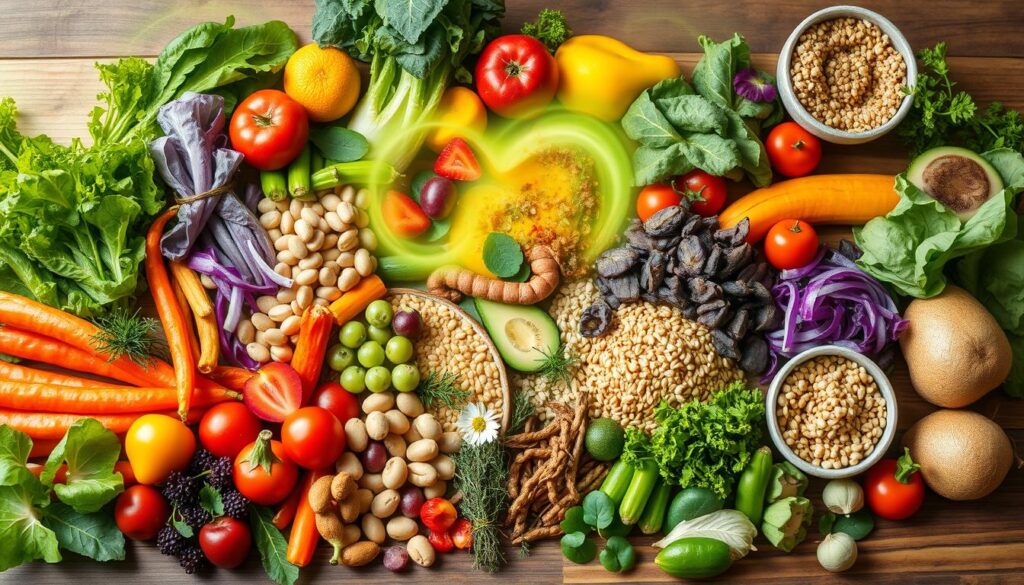The Power of Plants:
“How Vegetarian Diets Boost Your Health“
Plant-based diets are changing the game in modern wellness. They offer a way to better health and well-being. The benefits of vegetarian and vegan lifestyles are clear. They improve digestion and heart health, making us feel better overall.
Choosing plant-based foods can greatly impact our health. It opens up a world of tasty and nutritious options. These foods not only nourish us but also help the planet and promote kindness.

Key Takeaways
- Plant-based diets offer a wide range of health benefits, including improved digestion, heart health, and overall wellness.
- Embracing a vegetarian or vegan lifestyle can lead to enhanced physical and mental well-being, as well as a more sustainable and compassionate approach to living.
- The power of plants lies in their ability to nourish the body with a rich array of essential nutrients, vitamins, and minerals.
- Transitioning to a plant-based diet can be a transformative experience, leading to increased energy, improved weight management, and a reduced risk of chronic diseases.
- Incorporating more plant-based foods into one’s diet can have a positive impact on the environment, promoting sustainability and ecological responsibility.
Understanding Vegetarian Diets: A Comprehensive Overview
Vegetarian diets are becoming more popular. People choose them for health, environmental, and ethical reasons. But, there are many types of vegetarian diets, each with its own rules and nutritional needs.
Different Types of Vegetarian Diets Explained
The main types of vegetarian diets are:
- Lacto-ovo vegetarianism: You can eat dairy and eggs but not meat, poultry, or fish.
- Lacto-vegetarianism: You can have dairy but no eggs, meat, poultry, or fish.
- Ovo-vegetarianism: Eggs are okay, but no dairy, meat, poultry, or fish.
- Veganism: No animal products at all, including meat, poultry, fish, dairy, and eggs.
Key Components of Plant-Based Nutrition
People on plant-based diets need to watch their nutrients. They must make sure they get enough nutrient density for health. You can get protein, iron, calcium, vitamin B12, and omega-3s from plants like legumes, grains, nuts, seeds, and greens.
Making the Transition to Vegetarianism
Switching to a vegetarian diet can take time. It’s key to plan it well to stay healthy and manage weight. Start by slowly replacing animal foods with plant-based ones. Try new recipes and get advice from health experts or other vegetarians.

Discuss the benefits of plant-based diets, including improved digestion, heart
Plant-based diets offer many benefits, like better digestion and heart health. They also help reduce inflammation in the body. By eating a variety of fruits, vegetables, whole grains, legumes, and plant proteins, you can enjoy a healthier lifestyle.
Improved Digestive Health
Plant-based diets are great for your digestion. They have more fiber, which helps with regular bowel movements and reduces constipation. Fiber also feeds the good bacteria in your gut, keeping your digestive system healthy.
Heart-Healthy Benefits
Studies show that plant-based diets are good for your heart. They lower cholesterol and blood pressure, reducing the risk of heart disease. Plant foods are full of antioxidants and healthy fats that protect your heart.
Reduced Inflammation
Plant-based diets can fight inflammation, which is good for your health. They contain phytochemicals, antioxidants, and omega-3s that help reduce chronic inflammation. This can prevent many health problems, from arthritis to cancer.
| Benefit | Description |
|---|---|
| Improved Digestion | Increased fiber intake promotes regular bowel movements, reduces constipation, and supports a healthy gut microbiome. |
| Heart Health | Plant-based diets lower cholesterol levels, reduce the risk of hypertension, and decrease the likelihood of developing cardiovascular diseases. |
| Reduced Inflammation | The phytochemicals, antioxidants, and omega-3 fatty acids in plant-based foods combat chronic inflammation, which is linked to various health issues. |

Plant-based diets are a smart choice for your health. Whether you’re fully vegetarian or vegan, or just eat more plants, the benefits are amazing. This approach to nutrition can greatly improve your overall well-being.
Essential Nutrients in Vegetarian Diets and Their Sources
Choosing a vegetarian lifestyle can bring many health benefits. It’s important to make sure you get all the nutrients your body needs. Let’s look at the main sources of nutrient density, plant-based protein, and vitamins and minerals in vegetarian diets.
Plant-Based Protein Sources
You can get high-quality plant-based protein from many vegetarian-friendly foods. Some top choices are:
- Legumes (beans, lentils, chickpeas)
- Nuts and seeds (almonds, walnuts, chia, flax)
- Soy-based foods (tofu, tempeh, edamame)
- Quinoa and other whole grains
Vitamins and Minerals from Plant Foods
Vegetables, fruits, and other plant foods are full of important vitamins and minerals. Key nutrients for vegetarians include:
- Iron (leafy greens, fortified cereals, lentils)
- Calcium (leafy greens, tofu, fortified plant-based milk)
- Vitamin B12 (nutritional yeast, fortified plant-based milk)
- Zinc (nuts, seeds, legumes)
Healthy Fats in Vegetarian Diets
A well-planned vegetarian diet can give you plenty of healthy fats you need for health. Good sources are:
- Avocados
- Nuts and seeds
- Olives and olive oil
- Coconut and coconut oil
By choosing these nutrient-rich plant-based foods, vegetarians can meet their nutritional needs. This way, they can enjoy all the benefits of a plant-based lifestyle.

Weight Management and Body Composition Benefits
Choosing a vegetarian or plant-based diet can greatly benefit your weight and body shape. These diets are packed with nutrients and often lead to more weight loss. They also help in reducing body fat and building muscle.
Many vegetarians notice a boost in energy levels. This is thanks to the rich nutrients in their food, like fruits, veggies, whole grains, and legumes. These foods give a steady flow of energy and important vitamins and minerals. This energy helps support an active lifestyle, leading to more physical activity and better weight management.
Plant-based diets also help lower inflammation in the body. Inflammation can cause weight gain, insulin resistance, and other health issues. By eating less inflammatory foods, people may find it easier to keep a healthy weight and improve their body shape.
| Vegetarian Diet Benefits | Non-Vegetarian Diet |
|---|---|
| Increased energy levels | Potential for energy slumps |
| Reduced inflammation | Higher risk of inflammatory conditions |
| Improved weight management | Increased risk of weight gain and obesity |
Adopting a plant-based lifestyle can bring many benefits. You’ll see improvements in weight management, increased energy, and reduced inflammation. This leads to a healthier, more vibrant body.

The Connection Between Plant-Based Diets and Disease Prevention
Choosing a plant-based lifestyle can greatly improve your health. It’s especially good for preventing diseases. Many studies show that vegetarian and vegan diets can lower the risk of chronic conditions like cancer and heart disease.
Cancer Risk Reduction
Research shows that plant-based diets can lower cancer risk. People who eat mostly plants have fewer cases of cancers like colon, breast, and prostate. This is because plant foods are full of antioxidants, phytochemicals, and fiber.
Diabetes Management
Plant-based diets also help manage type 2 diabetes. They focus on whole, fiber-rich foods and avoid processed and high-glycemic foods. This helps keep blood sugar levels stable and improves insulin sensitivity.
Cardiovascular Health Improvements
Plant-based diets are great for heart health. They are low in saturated fat and cholesterol, which helps lower bad cholesterol. Plant foods are also rich in antioxidants, fiber, and healthy fats, improving heart health.
By choosing a plant-based diet, you can prevent diseases and improve your health. It’s a powerful way to reduce cancer risk, manage diabetes, and support heart health.
Environmental Impact and Sustainability of Vegetarian Diets
As we become more aware of our planet’s needs, choosing a vegetarian diet is key. It’s not just good for us but also for the Earth. Plant-based eating helps save natural resources and fights climate change.
Studies show that a vegetarian diet cuts down on greenhouse gas emissions. By choosing plant-based proteins, we help save land, water, and energy. This choice is better for the planet and can also lower body inflammation, improving our health.
| Sustainability Metric | Vegetarian Diet | Omnivorous Diet |
|---|---|---|
| Greenhouse Gas Emissions | Lower | Higher |
| Land Usage | Less | More |
| Water Consumption | Reduced | Increased |
| Energy Consumption | Lower | Higher |
Choosing a vegetarian lifestyle helps us build a greener future. It supports the health of our planet. This choice is part of a global push towards caring for our environment and natural resources.
“Adopting a vegetarian diet is one of the most impactful personal choices we can make to reduce our environmental footprint and combat climate change.”
Common Challenges and Solutions in Vegetarian Nutrition
Choosing a vegetarian lifestyle is rewarding but comes with unique challenges. You need to think about nutrient deficiencies and how to handle social situations. Vegetarians must make sure their diet meets their needs.
Addressing Nutrient Deficiency Concerns
Vegetarians often worry about not getting enough vitamin B12, iron, calcium, and omega-3 fatty acids. Good meal planning and sometimes supplements can help. This ensures a nutrient-dense diet.
Meal Planning Strategies
Planning meals well is crucial for a balanced vegetarian diet. Include a variety of plant-based proteins like legumes, nuts, and soy. Also, make sure to get enough fiber for improved digestion. Use recipe databases and meal-planning apps to make it fun and easy.
Social Aspects of Vegetarianism
Being a vegetarian can be tricky in social situations. When eating out or at gatherings, it’s important to talk about your diet. Being open and confident helps others understand and support your choices, aiding in weight management.
By tackling these challenges and finding solutions, vegetarians can flourish. They can enjoy the health benefits of a plant-based diet.
| Nutrient | Vegetarian Sources | Importance |
|---|---|---|
| Vitamin B12 | Fortified plant-based milk, nutritional yeast, tempeh | Essential for red blood cell formation and neurological function |
| Iron | Lentils, spinach, tofu, cashews | Crucial for oxygen transport and energy production |
| Calcium | Leafy greens, tofu, fortified plant-based milk | Vital for bone health and muscle function |
| Omega-3 Fatty Acids | Walnuts, flaxseeds, chia seeds | Promote heart health and brain function |
Building a Balanced Vegetarian Meal Plan
Starting a plant-based diet is exciting, but it’s important to make sure your meals are balanced. This balance is key to feeling more increased energy and staying optimal health. The trick is to eat a variety of nutrient-dense plant foods every day.
Begin with whole, unprocessed foods that are full of vitamins, minerals, and fibers. Try to eat a mix of leafy greens, colorful veggies, whole grains, legumes, nuts, and seeds. These foods not only feed your body but also boost your increased energy and nutrient density.
Meal Prep and Planning Tips
- Batch cook grains, roast veggies, and prep plant-based proteins like tofu or tempeh for quick meals.
- Try new recipes and flavors to keep your meals interesting and varied.
- Plan your meals for the week ahead to have all ingredients ready and avoid last-minute rushes.
Balanced Vegetarian Meal Ideas
- Whole grain bowl with roasted veggies, quinoa, and baked tofu
- Lentil and veggie curry with basmati rice
- Leafy green salad with avocado, chickpeas, and homemade vinaigrette
- Vegetable stir-fry with brown rice and cashews
- Whole wheat pasta with creamy cashew sauce and steamed broccoli
By planning ahead and choosing a variety of plant-based foods, you can make balanced, nutrient-dense meals. These meals will keep you energized and well-nourished all day long.
“A balanced plant-based diet is not only good for your health, but it’s also a sustainable choice for the planet.”
Conclusion
Embracing a plant-based diet brings big benefits for our health and the planet. Eating veggies, fruits, whole grains, and legumes gives us lots of vitamins and healthy fats. This can improve digestion, heart health, and lower the risk of diseases like cancer and diabetes.
Plant-based eating helps with weight management, lowers cholesterol, and blood pressure. It also reduces our need for animal products, which is good for the environment. This makes vegetarian or vegan choices a great option.
Starting a plant-based journey is exciting. Try new recipes and find tasty, healthy ingredients. Surround yourself with people who support you. With a positive attitude and commitment, you can enjoy a healthier, more sustainable life.
FAQ
What are the main benefits of adopting a plant-based diet?
Plant-based diets are great for your health. They improve digestion, heart health, and help with weight management. They also reduce inflammation and boost energy. These diets are packed with vitamins, minerals, and antioxidants that support wellness.
How do plant-based diets support digestive health?
Plant-based foods are high in fiber. This helps with regular bowel movements and a healthy gut. Eating more fruits, veggies, and whole grains supports a good gut microbiome. This leads to better digestion and nutrient absorption.
What are the heart health benefits of a vegetarian diet?
Vegetarian diets are good for your heart. They lower cholesterol and reduce heart disease risk. They are rich in healthy fats from avocados and nuts, which is good for your heart.
How can a plant-based diet aid in weight management?
Vegetarian diets are often lower in calories and higher in fiber. This helps you feel full and manage weight. The nutrient-rich nature of plant-based foods also helps control cravings and keep energy levels stable.
What role do plant-based diets play in reducing inflammation?
Plant-based foods are full of antioxidants and anti-inflammatory compounds. These help reduce body inflammation. This can lower the risk of chronic diseases and improve recovery from exercise.
How can a vegetarian diet help prevent diseases?
Studies show plant-based diets can lower cancer risk and help manage diabetes and heart disease. The diet’s nutrient-dense and anti-inflammatory properties are key to preventing and managing diseases.
What are the environmental benefits of adopting a vegetarian diet?
Plant-based diets are better for the environment. They reduce greenhouse gas emissions and conserve resources. They also support sustainable agriculture, making them a more eco-friendly choice than diets with meat and dairy.
How can vegetarians ensure they are getting all the necessary nutrients?
Vegetarians need to plan their meals well. They should eat a variety of nutrient-dense plant-based foods. This includes plant-based proteins, essential vitamins, minerals, and healthy fats. Sometimes, supplements are needed to fill specific nutrient gaps.

